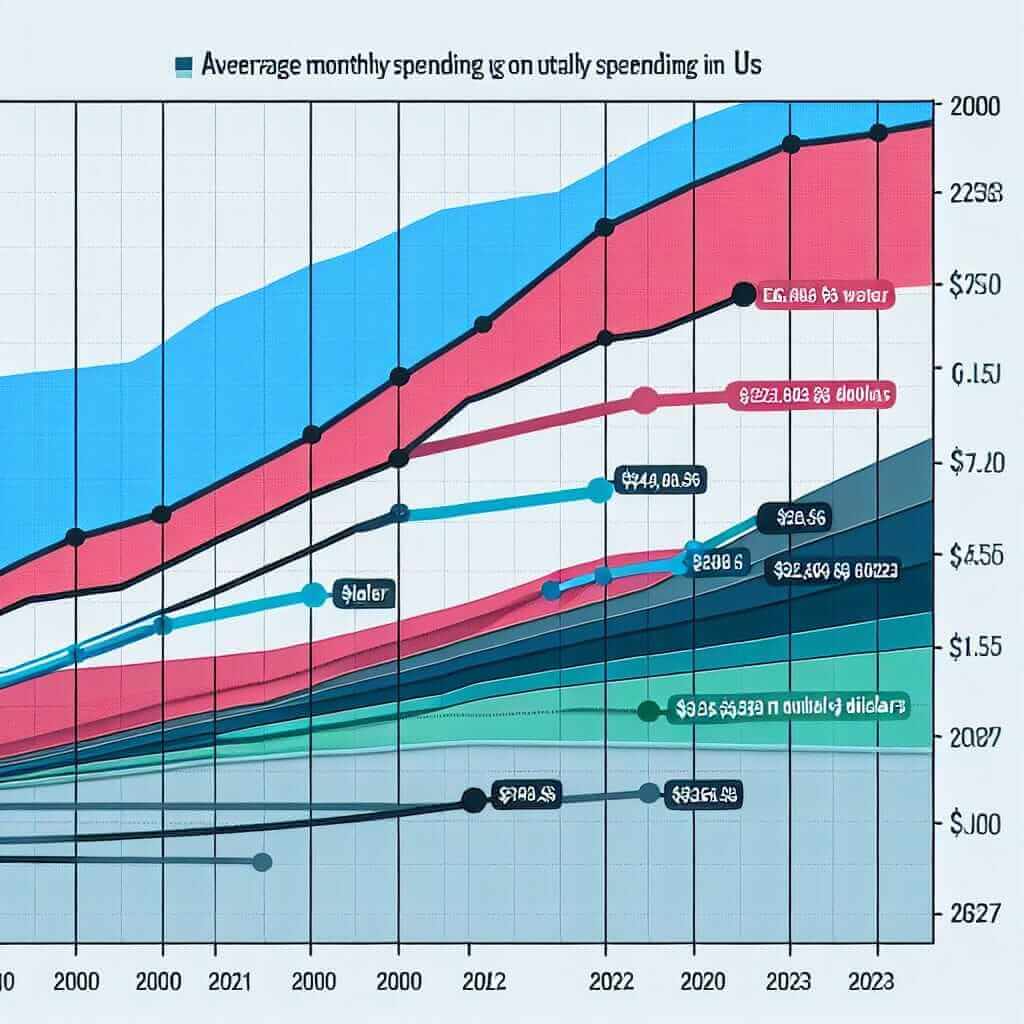In the IELTS Writing Task 1, candidates are often required to describe and analyze data presented in various forms, such as tables, charts, and graphs. One common topic is the “Average Monthly Spending on Utilities from 2000 to 2023.” In this guide, we will delve into the intricacies of this topic, providing an exemplary task, detailed analysis, sample answer, essential vocabulary, and crucial tips to help you secure a Band 7+ score.
Exploring the Topic: Average Monthly Spending on Utilities (2000-2023)
The topic of “Average Monthly Spending on Utilities (2000-2023)” is not only relevant for IELTS but also frequently appears in real-life data analysis scenarios. It typically involves presenting how utility costs (such as electricity, water, and gas) have varied over time and interpreting these changes.
Example Task
The following is an example task that you might encounter:
The table below shows the average monthly spending on utilities (electricity, water, and gas) in various years from 2000 to 2023. Summarize the information by selecting and reporting the main features, and make comparisons where relevant.
| Year | Electricity (USD) | Water (USD) | Gas (USD) |
|---|---|---|---|
| 2000 | 50 | 30 | 40 |
| 2005 | 60 | 35 | 45 |
| 2010 | 70 | 40 | 50 |
| 2015 | 80 | 45 | 55 |
| 2020 | 90 | 50 | 60 |
| 2023 | 100 | 55 | 65 |

Detailed Analysis
Let’s break down the task into manageable chunks to help create a well-structured response.
Understanding the Data
- Electricity Costs: Increased from $50 in 2000 to $100 in 2023.
- Water Costs: Rose from $30 in 2000 to $55 in 2023.
- Gas Costs: Climbed from $40 in 2000 to $65 in 2023.
Key Trends
- Overall Increase: All utility costs have increased steadily over the years.
- Electricity: Represents the highest increase among the three utilities.
- Gas vs. Water: The cost of gas has consistently been higher than water but shows a similar rate of increase.
Example Writing Task 1 Response
Task: The table below shows the average monthly spending on utilities (electricity, water, and gas) in various years from 2000 to 2023. Summarize the information by selecting and reporting the main features, and make comparisons where relevant.
Sample Answer:
The table provides an overview of the average monthly spending on three utilities (electricity, water, and gas) from 2000 to 2023. Overall, the data indicates a significant upward trend in utility costs over the 23-year period.
In 2000, households spent $50 on electricity, which increased gradually, reaching $100 by 2023. This marks a doubling in cost over the given period. Similarly, the cost of water rose from $30 in 2000 to $55 in 2023. Interestingly, the increase in water costs was consistently lower than that of electricity, reflecting a steady yet less aggressive upward trend.
Gas expenditure followed a similar pattern to electricity, starting at $40 in 2000 and rising to $65 by 2023. Although the rise was not as steep as for electricity, gas costs experienced a $25 increase, which is indicative of the overall inflation and increased utility usage over the years.
In summary, while all utility costs have increased from 2000 to 2023, electricity saw the most substantial rise, followed by gas and water. This progression underscores the growing financial burden of utility expenses on households over time.
Word Count: 183
Essential Tips for Writing Task 1
- Focus on Key Features: Identify the main trends and significant features in the data.
- Use Accurate Comparisons: Make comparisons to highlight differences and similarities.
- Organize Your Response: Structure your writing in a clear and logical manner with an introduction, body paragraphs, and conclusion.
- Vary Your Vocabulary: Use a range of vocabulary to avoid repetition and demonstrate language proficiency.
Important Vocabulary and Phrases
- Upward Trend (noun): A consistent increase.
- Example: “The data shows an upward trend in the cost of electricity.”
- Gradually (adverb): Slowly over a period of time.
- Example: “The cost of water increased gradually.”
- Substantial (adjective): Large in amount.
- Example: “Electricity saw a substantial rise in costs.”
- Overall (adverb): In general.
- Example: “Overall, utility costs have increased.”
- Consistently (adverb): Without changing.
- Example: “Gas costs remained consistently higher than water costs.”
- Inflation (noun): The rate at which the general level of prices for goods and services rises.
- Example: “Utility costs reflect overall inflation.”
Conclusion
To excel in the IELTS Writing Task 1, it is crucial to develop skills in interpreting data, identifying key trends, and structuring your response effectively. Understanding how to analyze data like “Average Monthly Spending on Utilities (2000-2023)” can significantly enhance your ability to score high. Remember to use varied vocabulary, maintain clarity, and focus on key features to achieve a Band 7+ score.